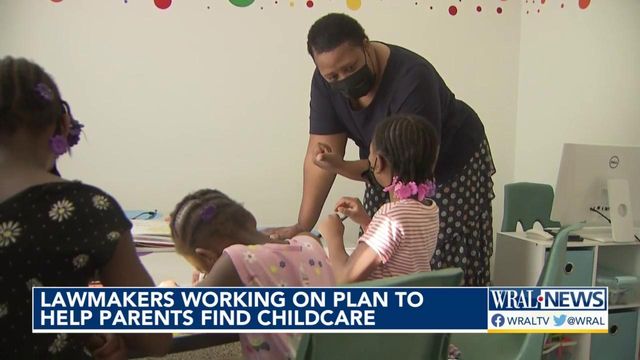Bills aim to fund, reform NC's child care system
A worker shortage, fueled by low wages, in North Carolina daycares and preschools is causing problems for parents and the economy as a whole. State lawmakers are proposing fixes.
Posted — UpdatedA bipartisan coalition of North Carolina lawmakers rolled out a package of bills Thursday to boost the state’s daycare industry, which is struggling to find the workers it needs to offer affordable care to working parents.
Their No. 1 ask is $300 million in extra state subsidies. That money would supplement teacher salaries as pandemic-era federal funding now propping up the system runs out later this year. Day care owners say they’re losing employees — “brain builders,” as one Raleigh preschool director called them — to fast food restaurants and other retailers that pay better.
“Our brain builders are off to Target and Costco to make $18 an hour with less responsibility,” said Michelle Miller Cox. “The childcare industry was already broken before the pandemic struck, but now we’re on the verge of crumbling.”
Lawmakers also want changes to the state rating system that assigns stars, one through five, to day cares and preschools, as well as additional subsidy boosts for rural areas where, right now, the state puts less money into the system per child than it does in urban areas.
There’s also a bill to nudge the state toward longer-term reforms by starting a pilot program in three yet-to-be-decided counties that would rework the way daycare is financed, relying on contributions from businesses as well as parents and the government. Although some businesses offer child care, it’s largely the parents' responsibility, with government subsidies helping out at lower income levels.
A fifth bill addresses infant and maternal morbidity by boosting the amount of prenatal care the state covers for Medicaid patients. The United States’ maternal death rate is higher than all other wealthy countries, and North Carolina is the 10th worst state for infant deaths. The problem is even worse for Black mothers, who are three to four times more likely to die in childbirth compared to white mothers.
Each bill’s fate is uncertain this early in the legislative session, but the broader push has significant backing. Debra Derr, a government affairs director at the NC Chamber, one of the state’s most influential business groups, spoke at a Thursday news conference on the measures. A lack of affordable child care is exacerbating workforce shortages across the economy, and addressing that in North Carolina is one of the chamber’s top priorities this session, she said.
At Thursday’s press conference, Daphne Alsiyao held her 8-month-old daughter in her arms as she called for reforms. Alsiyao, who works with the North Carolina Partnership for Children, said she and her husband, a Guilford County sheriff’s deputy, can’t find childcare in the Triad, and that she’s lost count of how many wait lists they’ve added their daughter to.
“Forget affordable," she said. "At this point we’re just looking for something that is safe and high quality.”
“Childcare is an essential infrastructure that keeps our economy running,” she said. “We need lawmakers to treat this crisis like the emergency it is.”
The issue has the attention of Republican legislative leadership, and Democratic Gov. Roy Cooper is expected to include new daycare funding in his upcoming budget proposal.
Senate Republican Leader Phil Berger, R-Rockingham, said Thursday that the General Assembly is “probably going to do something” this session.
“As far as any specificity … I think it’s a little premature for that,” Berger told reporters.
Some of the ideas proposed Thursday, or other proposals on the welfare of young children, may be combined with forthcoming legislation to tighten North Carolina’s abortion restrictions, which is a major goal for the General Assembly’s Republican majority.
Speaker of the House Tim Moore has said several times that there’s interest in the House in taking a more holistic look at how the state helps infants and mothers. He told a gathering of antiabortion activists late last month that “the commitment to life is not only about ensuring that a child is born, but it’s also about ensuring that mother’s taken care of.”
“It’s ensuring that that child is provided for, is provided a whole gamut of care,” said Moore, R-Cleveland. “I think it’s very important that, whatever we do [on abortion], we look at it from a comprehensive manner.”
The proposals announced Thursday are split into five bills, which will be introduced in both the House and Senate, according to Wheeler Clemmons, a co-chair of the General Assembly’s Early Childhood Caucus.
The maternal morbidity legislation is House Bill 321, and the pilot project details are contained in House Bill 322.
The state grants to boost teacher pay are in House Bill 342, House Bill 343 would boost funding in rural areas and the star rating reforms are in House Bill 344.
Related Topics
• Credits
Copyright 2024 by Capitol Broadcasting Company. All rights reserved. This material may not be published, broadcast, rewritten or redistributed.






